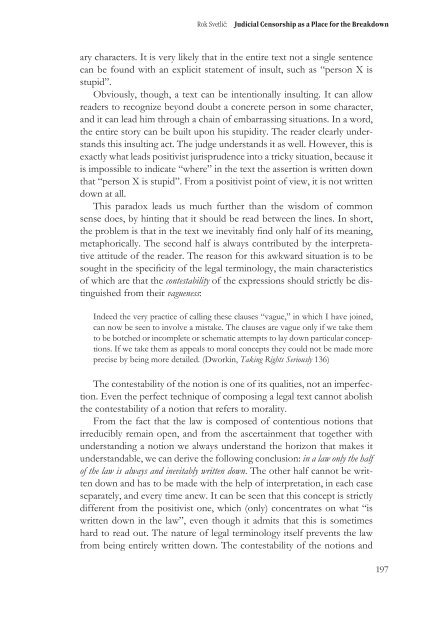Literatura in cenzura - Društvo za primerjalno književnost - ZRC SAZU
Literatura in cenzura - Društvo za primerjalno književnost - ZRC SAZU
Literatura in cenzura - Društvo za primerjalno književnost - ZRC SAZU
- No tags were found...
You also want an ePaper? Increase the reach of your titles
YUMPU automatically turns print PDFs into web optimized ePapers that Google loves.
Rok Svetlič:Judicial Censorship as a Place for the Breakdownary characters. It is very likely that <strong>in</strong> the entire text not a s<strong>in</strong>gle sentencecan be found with an explicit statement of <strong>in</strong>sult, such as “person X isstupid”.Obviously, though, a text can be <strong>in</strong>tentionally <strong>in</strong>sult<strong>in</strong>g. It can allowreaders to recognize beyond doubt a concrete person <strong>in</strong> some character,and it can lead him through a cha<strong>in</strong> of embarrass<strong>in</strong>g situations. In a word,the entire story can be built upon his stupidity. The reader clearly understandsthis <strong>in</strong>sult<strong>in</strong>g act. The judge understands it as well. However, this isexactly what leads positivist jurisprudence <strong>in</strong>to a tricky situation, because itis impossible to <strong>in</strong>dicate “where” <strong>in</strong> the text the assertion is written downthat “person X is stupid”. From a positivist po<strong>in</strong>t of view, it is not writtendown at all.This paradox leads us much further than the wisdom of commonsense does, by h<strong>in</strong>t<strong>in</strong>g that it should be read between the l<strong>in</strong>es. In short,the problem is that <strong>in</strong> the text we <strong>in</strong>evitably f<strong>in</strong>d only half of its mean<strong>in</strong>g,metaphorically. The second half is always contributed by the <strong>in</strong>terpretativeattitude of the reader. The reason for this awkward situation is to besought <strong>in</strong> the specificity of the legal term<strong>in</strong>ology, the ma<strong>in</strong> characteristicsof which are that the contestability of the expressions should strictly be dist<strong>in</strong>guishedfrom their vagueness:Indeed the very practice of call<strong>in</strong>g these clauses “vague,” <strong>in</strong> which I have jo<strong>in</strong>ed,can now be seen to <strong>in</strong>volve a mistake. The clauses are vague only if we take themto be botched or <strong>in</strong>complete or schematic attempts to lay down particular conceptions.If we take them as appeals to moral concepts they could not be made moreprecise by be<strong>in</strong>g more detailed. (Dwork<strong>in</strong>, Tak<strong>in</strong>g Rights Seriously 136)The contestability of the notion is one of its qualities, not an imperfection.Even the perfect technique of compos<strong>in</strong>g a legal text cannot abolishthe contestability of a notion that refers to morality.From the fact that the law is composed of contentious notions thatirreducibly rema<strong>in</strong> open, and from the ascerta<strong>in</strong>ment that together withunderstand<strong>in</strong>g a notion we always understand the horizon that makes itunderstandable, we can derive the follow<strong>in</strong>g conclusion: <strong>in</strong> a law only the halfof the law is always and <strong>in</strong>evitably written down. The other half cannot be writtendown and has to be made with the help of <strong>in</strong>terpretation, <strong>in</strong> each caseseparately, and every time anew. It can be seen that this concept is strictlydifferent from the positivist one, which (only) concentrates on what “iswritten down <strong>in</strong> the law”, even though it admits that this is sometimeshard to read out. The nature of legal term<strong>in</strong>ology itself prevents the lawfrom be<strong>in</strong>g entirely written down. The contestability of the notions and197
















